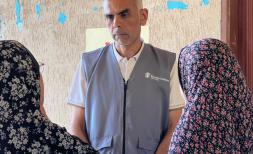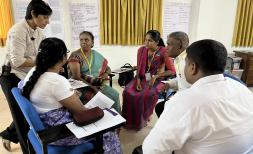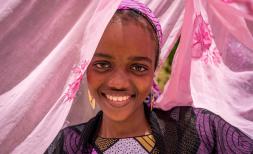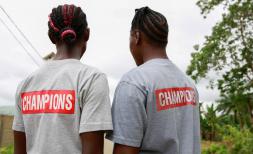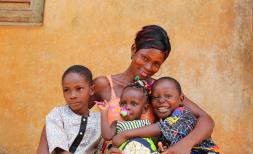Countdown to the Global Refugee Forum: A Spotlight on Colombia
Sebastian*,16, is a Venezuelan refugee who moved to Colombia with his mother Maria*, 40, and sister Joana*, 11, four years ago.
Sebastian* has not managed to go back to school since leaving Venezuela due to his mother not being able to get the money needed to cover his tuition and school supplies. He spends his time in the park and attending a children's club where he learns about his rights and how to express himself. He wishes to be able to go back to school one day and go to university to help other children get an education. He dreams of access to an education and this dream can be fulfilled with the support of the international community.
In December 2023, leaders from across the globe will gather for the 2nd Global Refugee Forum, it is a landmark opportunity to deliver decisive action for refugee children. Earlier this year, Save the Children published a new report – The Price of Hope - detailing the progress made on refugee education since 2019. This blog series is counting down to the start of the GRF with a deeper dive into some of the top refugee hosting countries, this week we are taking a closer look at Colombia.
WHAT IS THE SITUATION IN COLOMBIA?
Colombia is home to one of the largest refugee populations in the world, hosting 2,894,593 migrants and refugees mostly from those fleeing the instability and insecurity in neighbouring Venezuela. The country is itself a nation mired by a decades-long civil conflict that has led to significant loss of life, with it holding the largest number of IDP’s in the Americas and 4th in the world, the conflict increasingly threatens the safety of Venezuelans also residing in Colombia. The most recent Venezuelan displacement crisis erupted with the collapse of the economy in 2014, leading to millions fleeing the country in search of stability. The Venezuelan migrant and refugee population in Colombia, equivalent to 37% of the total number of Venezuelans who fled the country, mainly consists of families with children and other vulnerable groups, their experience is characterised by poverty, economic hardship compounded by the Covid-19 pandemic and, heightened security risks.
The Government of Colombia has an ‘open-door policy’ to Venezuelans. This includes regularisation pathways that enable migrants to legally access services, such as health and education, up to 1.8 million have used this pathway. The Ministry of National Education (MoNE) has guidelines specifically to tackle legal barriers and promote education access for migrants. Currently 6% of students enrolled in national education in Colombia are Venezuelan. The number of migrants and refugees within the formal education has been increasing, currently standing at 612.968 children with the majority being in primary education (539.645). The MoNE recognises the need for more flexible education models that allow for enrolment throughout the year and additional support to students with diverse needs.
PERSISTENT BARRIERS TO REFUGEE INCLUSION IN EDUCATION
Explicit exclusion of refugees on discriminatory grounds continues to plague the lives of many in Venezuela, wherein formal prerequisites such as the possession of legal documentation do not exist but are systematically used to reject students enrolment or even their graduation where they have completed the learning and examination. When enrolled, many migrant and refugee children encounter the harsh realities of discrimination and bullying both by students and teachers alike, inflicting psychological and emotional wounds that cap their educational outcomes and cause lasting damage to wellbeing. This is in addition to the existing traumatic wounds faced by significant numbers of refugee children in Colombia who experience the violence of conflict, such as forced recruitment and gender-based violence.
Economic fragility of the state throws up further barriers wherein the Colombian education systems’ limited capacity struggles to accommodate the large refugee population. Adding to this complexity, the economic hardship faced by many refugee populations compels many children to abandon their education in favour of labour or caretaking responsibilities. Prolonged disruptions to education make it more difficult to attain adequate grades for their corresponding year group, leading to lower grade placements, exponentially increasing the likelihood of premature school abandonment.
ECONOMIC HARDSHIP STUNTING PROGRESS FOR ALL MIGRANT CHILDREN
The government of Colombia has worked to integrate refugees into national infrastructure such as education, the social security system and, free emergency healthcare for all Venezuelan migrants. As with the 3 other countries ranked as the 4 top refugee-hosting countries, Colombia is an upper middle-income country, leaving it ostensibly better placed to handle the large displacement crisis.
However, given the higher inequality, the 8th among the countries with the highest income inequality in the world, their social integration is still limited.vii Research by the IMF has found Venezuelan migrants are more educated than local populations and yet face higher levels of unemployment and lower wages than local workers in equivalent jobs. Colombia’s inclusive approach to addressing the migrant crisis has helped lessen the impact on its refugee population, policies such as rent subsidies helped families save rent money to secure housing on a more long-term basis.
A recent Save the Children report found that Colombia spent significantly more of their GDP on education than on servicing external debt in 2020, at 5% compared to 2.6% on the latter. Figures released by the IMF show that Colombia’s debt continues to rise and its general government gross debt reached 62% of its GDP in 2021. The Colombian economy has fluctuated in the last few years as it navigated the transition to a new government and the Covid-19 pandemic, its GDP grew significantly by 7.3% in 2022 but growth is expected to slow to only 1.3% in 2023, slower but steady growth is expected to continue into the coming years.
The government of Colombia’s approach to refugee inclusion is commendable in the face of one of the largest displacement crises in the world. Colombia needs the support of the international community to meet the complex needs of its refugee population. As one of the co-convenors of this years GRF, Colombia released a joint statement with the 5 other co-convening states stressing the importance of mobilising action for refugees that encompassed the whole-of-government and society, as well as encouraging innovation on interventions and financing for refugee situations.
Without much needed support refugee children are being denied access to the life-saving and protective impacts of a quality education in a safe school environment. The international community must mobilise at the upcoming GRF to deliver bold action that ensures an education for every last refugee child, like 16-year-old Sebastian* in countries like Colombia.
FIVE THINGS SAVE THE CHILDREN WANTS TO SEE AT THE 2023 GLOBAL REFUGEE FORUM
- Make the promise of the Global Compact on Refugees a reality. The Global Compact provide blueprints to ensure that refugees, as well as host communities, get the support they require to meet their education needs. We must not waste this opportunity.
- Put refugee children at the heart of the Global Refugee Forum. They are experts on the challenges they face, their safe and meaningful participation must be prioritised.
- Prioritise matched pledges to advance responsibility sharing. Educating refugee children is a global public good and must be a shared global responsibility.
- Pledges must be meaningful, accountable and actionable. It is imperative that all pledges include timelines for completion and measurable targets and indicators so that progress can be properly tracked.
- Focus on the money needed to ensure all refugees have access to quality education. Opening education to all refugee children and including them in national education systems can be achieved at an estimated annual cost of US$4.85 billion globally.
